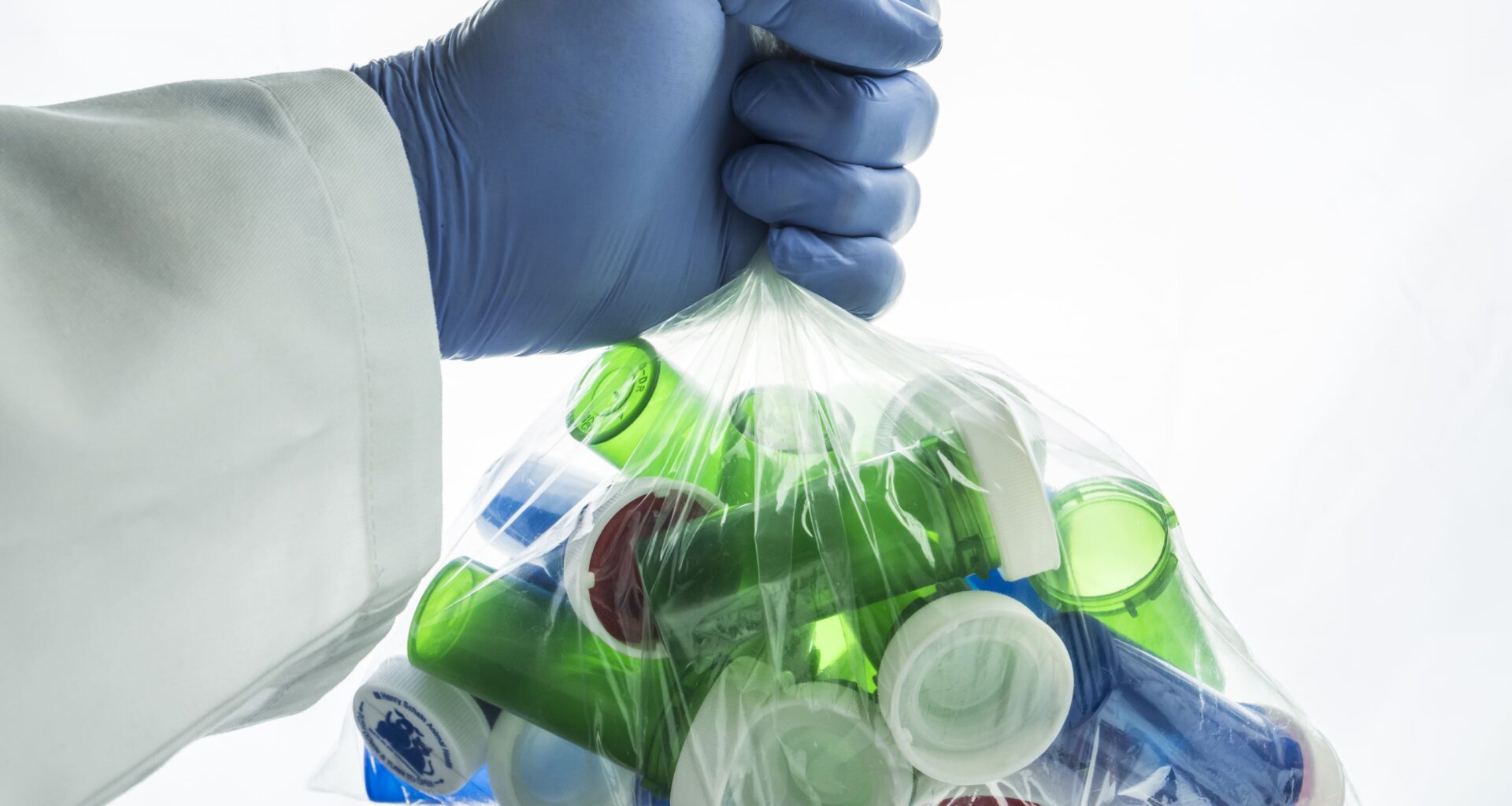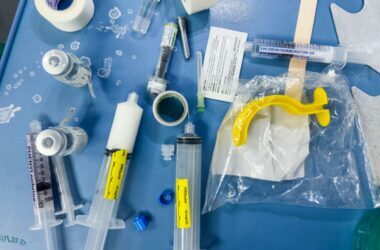Take this scenario: you have finished your course of antibiotics, feeling much better. But what do you do with the leftover pills? While tossing them in the trash or flushing them down the drain might seem convenient, these seemingly harmless actions contribute to a growing environmental and public health threat – pharmaceutical waste.
Pharmaceuticals have been identified as emerging contaminants in the marine ecosystem, mainly due to increased use and improper disposal. The main reason for this global threat is that most pharmaceutical active ingredients are not treated before they are released into the marine system, where they affect living organisms. This has led us to a point where finding pharmaceutical waste solutions isn’t an option but a necessity.
Today’s blog covers this growing global concern, the reasons behind it, and a sustainable solution that will lead us to a better future.
The Silent Threat Of Expired Drugs
Pharmaceutical waste solutions have become a pressing concern due to the increasing use of medications worldwide. The rise in chronic diseases and aging population have led to an exponential surge in prescriptions filled. Unfortunately, a significant portion of these medications go unused and eventually expire. The problem? Improper disposal of these expired drugs is a significant threat to our environment and public health.
Where Does Expired Medication Go?
Studies reveal a disturbing trend: a large percentage of expired medications end up in landfills or flushed down drains. Typically, this waste includes antibiotics, analgesics, hormones, antidepressants, steroids, and contraceptives. Landfills aren’t designed to break down and process the pharmaceuticals, and these potent chemicals can either leach into the soil or contaminate groundwater. Further, flushing medications exposes aquatic life to these drugs, disrupting ecosystems and potentially entering the food chain.
The Consequences Of Improper Disposal
The consequences of improper disposal of expired medications lead to a ripple effect that affects the environment, public health, and animal safety. Here’s a closer look at these far-reaching perils:
- Environmental Contamination: When medications are flushed or thrown away, they can enter our water systems. These drugs aren’t designed to be broken down by wastewater treatment plants and find their space in rivers, lakes, and ultimately, oceans. This contamination disrupts aquatic ecosystems. Researchers suggest negative impacts on fish behavior, reproduction, and even mortality. Furthermore, a potential link between this contamination and the rise of antibiotic resistance in fish is further classified as a critical public health concern.
- Unforeseen Health Effects: Trace amounts of pharmaceuticals, including antibiotics, hormones, and antidepressants, have been detected in drinking water supplies. The long-term health effects of getting in contact with these low doses are still under investigation, but scientists are concerned about potential impacts on everything from endocrine function to antibiotic resistance in humans.
- Accidental Poisoning: Expired medications left unsecured in homes pose a significant risk of unintentional poisoning, especially for young children and pets. Children are naturally drawn to colorful pills, mistaking them for candy. Pets can also be poisoned by ingesting medications left within reach. These incidents can be life-threatening and require immediate medical attention.
Beyond the immediate dangers, improper medication disposal also represents a significant economic burden. Environmental cleanup efforts, treatment for accidental poisoning cases, and the potential for spiked healthcare costs linked with antibiotic resistance all contribute to the financial strain.
Reverse Logistics Strategies For Pharmaceutical Waste Disposal
The good news is there’s a solution: reverse logistics for pharmaceuticals. Reverse logistics refers to the process of collecting and managing used or expired products. In the context of pharmaceuticals, it involves setting up safe and convenient systems for individuals to return their unwanted medications. There are significant advantages of this approach to pharmaceutical waste disposal, a few of which are listed below:
- Environmental Protection: By safely collecting and disposing of expired drugs, we can prevent them from contaminating water and soil and prevent it from transforming into a public health concern.
- Public Health Safeguards: Secure disposal programs minimize the risk of accidental poisoning and medication misuse.
- Economic Advantages: Reducing environmental damage and healthcare costs associated with improper disposal translates to significant financial savings.
Recent Trends In Pharmaceutical Waste Solutions
The field of pharmaceutical waste solutions is constantly evolving. Here are some recent trends:
- Innovative Take-Back Programs: Pharmaceutical companies are partnering with waste management companies to deliver convenient take-back programs, facilitating individuals to return their medications easily.
- Mail-in Collection Programs: Programs are being developed so that individuals can safely mail their expired drugs back to contain expired pharmaceutical products.
- Community Take-Back Events: Dedicated periodic events are organized for communities to gather and properly dispose of unwanted medications.
- Emerging Technologies: The future holds promise for tamper-proof packaging with clear disposal instructions and biodegradable drug delivery systems to minimize waste.
What You Can Do To Be Part Of The Solution?
While advancements in pharmaceutical waste solutions are heading in the right direction, individual action is equally crucial. Here’s how you can contribute:
- Store Medications Properly: Carefully follow the storage instructions on the label to make sure the potency and effectiveness of the medication is kept intact.
- Dispose Of Expired Drugs Safely: Look for take-back programs from your local pharmacy or participate in community collection events. Never flush medications or throw them in the trash.
- Spread Awareness: Talk to individuals in your close circle and acquaintances about the importance of proper medication disposal. Advocate for increased public awareness campaigns on this critical issue.
The Role Of Stakeholders In Promoting Sustainable Drug Disposal Methods
The responsibility doesn’t solely lie with individuals. Here’s how healthcare stakeholders can be central in this waste disposal process:
- Pharmaceutical Companies: Investing in sustainable packaging with clear disposal instructions and exploring the development of biodegradable drug delivery systems can notably reduce waste.
- Government Agencies: Developing regulations for safe disposal practices and funding public awareness campaigns will promote responsible disposal behavior.
In Conclusion
The issue of pharmaceutical waste solutions is complex, but by adopting innovative solutions, like reverse logistics strategies, and encouraging collaboration among individuals, pharmaceutical companies, and government agencies, we can make a significant difference. We can ensure a healthier future for ourselves and the environment by taking action today.
FAQs
Q: Is it safe to throw away unused medications in their original packaging?
A: It’s generally not recommended. Original packaging might contain personal information or instructions that could be misused. To be safe, remove any identifying labels before disposal.
Q: Can expired medications be used later?
A: No. Expired medications may lose their potency or develop harmful side effects. Always follow the expiration date and dispose of expired drugs safely.
Q: What about medications used by pets?
A: Expired pet medications pose similar risks. Never give expired medication to your pet. Look for specific disposal instructions on the label or consult your veterinarian.
Useful Links
Visit the following resources to learn more about pharmaceutical waste solutions and find safe disposal options in your area:
US Food and Drug Administration (FDA): https://www.fda.gov/drugs/safe-disposal-medicines/how-safely-dispose-unused-or-expired-medicine-video-transcript
Environmental Protection Agency (EPA): https://www.epa.gov/hw
American Medicine Disposal Coalition: https://www.dea.gov/takebackday














